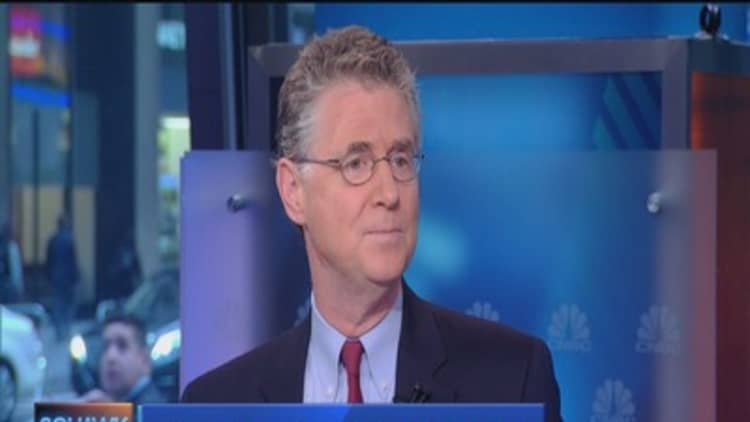
As the drop in high-yield, or junk, bonds, claimed its biggest victim since the 2008 financial crisis, BlackRock's Peter Fisher said Monday he does not see the risky end of the corporate fixed income market sinking the overall U.S. economy like the bust in subprime mortgages did during the Great Recession.
"[The junk bond drop] may feel like it for corporate CFOs, but I don't think it's systemic for GDP in the same way," Fisher told CNBC's "Squawk Box," in the wake of Third Avenue Management's decision, announced Thursday, to block further investor redemptions from its near $1 billion high-yield Focused Credit Fund, which was being liquidated.
Read MoreThird Avenue dumps CEO Barse amid turmoil
A day later, on Friday, Stone Lion Capital Partners, a $1.3 billion hedge fund specializing in distressed debt, suspended redemptions in its oldest fund, which like Third Avenue has been hit by companies defaulting on their obligations.
"Normally when you see this sort of acceleration in implied default rates … that sort of ... uptick would tell you a recession is around the corner," said Fisher, senior director of the BlackRock Investment Institute, which helps the firm's portfolio managers stay connected to marketplace trends. But this time, he said, the default rates might be revealing what's already known: "We've had a recession in the oil patch."
The collapse in commodities, most notably in crude, has been the biggest driver behind the pressure in the high-yield market. The energy sector accounts for about 15 percent of junk bond issuance and almost as much comes from companies in the metals and mining sector.
Billionaire investor Carl Icahn told CNBC in a phone interview Friday: "The high-yield market is just a keg of dynamite that sooner or later will blow up." It's not the first time Icahn has been critical of junk bonds. Sitting right next to BlackRock chief Larry Fink at CNBC's Delivering Alpha conference in July, Icahn accused Fink's investment firm of pushing up the high-yield market through offering exchange-traded funds (ETFs), which he said are illiquid.
Fisher on CNBC Monday took issue with the notion that junk bond ETFs are not liquid. "We had 4.5 billion almost in volume just in BlackRock's HYG high yield ... on Friday." That compares, he continued, to the cash market, which "on a normal day does 6 to 9 billion" in volume.
Even with record volumes of $9.8 billion last week there was only $560 million of redemptions in the iShares iBoxx $ High Yield Corporate high-yield ETF (HYG) — a ratio of 17 to 1 — for the entire week, according to BlackRock. This means for every $17 of HYG that traded on exchange, only $1 of high-yield bonds was traded to support it.
HYG fell 2 percent Friday. The fund was off 11.25 percent for the year ahead of Monday's trading.
With the Federal Reserve keeping interest rates near zero percent since December 2008, the junk bond market, which can track the stock market's moves, had been a place to find yield.
Read MoreStock pop 2016? These things must happen: Bob Doll
"I think we could see the U.S. economy as a whole do OK. But we could see the corporate sector not do so great, because the cycles are out of sync," Fisher said. "Margins already had their run. This is one of the problems of the Fed having extended what they've done so long."
He expects the central bank to hike short-term interest rates on Wednesday after its two-day policy meeting, calling the move "the most telegraphed event ever."
One of the positives from years of easy money by the Fed is "trillions of dollars of excess reserves sloshing around the banking system looking for something to do," Fisher said. "So the race for the exits now isn't going to be the same as was in 2007 and 2008."


